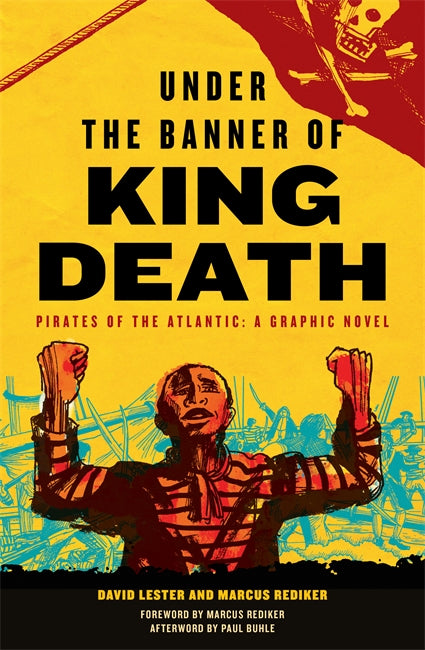Under the Banner of King Death: telling the story of piracy from below
The graphic novel is an adaptation of historian Marcus Rediker’s Villains of All Nations

Reviews & Culture
Dave Clinch
Tuesday 05 March 2024
SOCIALIST WORKER
Under the Banner of King Death gives a visual perspective on the history of piracy
A new book—Under the Banner of King Death—is from the team that produced Prophet Against Slavery about the life of the abolitionist Benjamin Lay.
It is an adaptation of Villains of All Nations by distinguished professor of history Marcus Rediker, which examines the period 1660 to 1720, known as the “Golden Age” of piracy.
Set in graphic novel form, the book brings a visual perspective to our history “from below”.
The graphic novel is increasingly being used by educators who understand that students are more receptive to what could be termed “visual literature”.
A new book—Under the Banner of King Death—is from the team that produced Prophet Against Slavery about the life of the abolitionist Benjamin Lay.
It is an adaptation of Villains of All Nations by distinguished professor of history Marcus Rediker, which examines the period 1660 to 1720, known as the “Golden Age” of piracy.
Set in graphic novel form, the book brings a visual perspective to our history “from below”.
The graphic novel is increasingly being used by educators who understand that students are more receptive to what could be termed “visual literature”.
The authors raise the profile of predominantly ordinary working sailors from diverse backgrounds, “poor men from the lowest social class”, as Rediker notes in the foreword.
David Lester’s unique, exquisite and meticulously researched illustrations elevate the lives of the pirates of this period. These figures are John Gwin, an African American fugitive from slavery in South Carolina.
Ruben Dekker an ordinary seafarer from Amsterdam and Mark Reed, an American woman “Mary”, who dressed in male clothing.

Aboard The Night Rambler decisions are made by voting on equal shares of the spoils from “prize” ships.
The captain only had control of going into action against another ship. Sailors were effectively living in an embryonic social democracy.
The book portrays the “London elite”, horrified by the threat to their profits, employing a ruthless sea-captain, William Snelgrave, to find, kill or arrest the pirates.
In an informative afterword, essay historian Paul Buhle explores ‘the images of pirates through centuries of readers from Robert Louis Stevenson to the portrayals in DC comics and Hollywood films.
He shows how Rediker’s research has brought about a fundamental reinterpretation of the lives of these courageous “villains of all nations”.
People from a myriad of ethnic backgrounds created a system of work and reward which benefited all, despite constant threat of bloody ruling class revenge.
It is a beautifully presented sometimes moving visual narrative for young readers and adults alike. Our history—from below. Under the Banner of King Death—Pirates of the Atlantic A graphic novel by David Lester with Marcus Rediker and Paul Buhle

Under the Banner of King Death: Pirates of the Atlantic, A Graphic Novel
by David Lester and Marcus Rediker
Illustrated by David Lester
Afterword by Paul Buhle
Foreword by Marcus Rediker
Paperback
136 pages / July 2023 / 9781804293492
Under the Banner of King Death: Pirates of the Atlantic, A Graphic Novel | Verso Books
A graphic exploration of action, resistance, and radicalism among eighteenth-century pirates
Under the Banner of King Death is a tale of mutiny, bloody battle, and social revolution, bringing to life an itinerant community of outsiders behind today’s legends. This graphic novel breaks new ground in our understanding of piracy and pirate culture, giving us real reasons to love the rebellious and stouthearted marauders of the seas.
At the pinnacle of the Golden Age of Atlantic piracy, three unlikely companions are sold into servitude on a merchant ship and thrust into a voyage of rebellion. They are John Gwin, an African American fugitive from bondage in South Carolina; Ruben Dekker, a common seaman from Amsterdam; and Mark (a.k.a. Mary) Reed, an American woman who dresses as a man.
When the crew turn to mutiny, they and the freed slaves establish democracy aboard The Night Rambler. This new dispensation provides radical social benefits, all based on the documented practices of real pirate ships of the era: democratic decision-making, a social security net, health and disability insurance, and an equal distribution of spoils taken from prize ships. But before long the London elites enlist a war-hungry captain to take down The Night Rambler in a war that pitches high society against high-seas freebooters.
Adapted from the scholarship and research of celebrated historian Marcus Rediker, Under the Banner of King Death is an inspiring story of the oppressed steering a course against adversity and injustice.
SEE
Pirate Enlightenment, or the Real Libertalia Hardcover
– January 24, 2023
by David Graeber (Author)
The final posthumous work by the coauthor of the major New York Times bestseller The Dawn of Everything.
Pirates have long lived in the realm of romance and fantasy, symbolizing risk, lawlessness, and radical visions of freedom. But at the root of this mythology is a rich history of pirate societies―vibrant, imaginative experiments in self-governance and alternative social formations at the edges of the European empire.
In graduate school, David Graeber conducted ethnographic field research in Madagascar for his doctoral thesis on the island’s politics and history of slavery and magic. During this time, he encountered the Zana-Malata, an ethnic group of mixed descendants of the many pirates who settled on the island at the beginning of the eighteenth century. Pirate Enlightenment, or the Real Libertalia, Graeber’s final posthumous book, is the outgrowth of this early research and the culmination of ideas that he developed in his classic, bestselling works Debt and The Dawn of Everything (written with the archaeologist David Wengrow). In this lively, incisive exploration, Graeber considers how the protodemocratic, even libertarian practices of the Zana-Malata came to shape the Enlightenment project, which for toolong has been defined as distinctly European. He illuminates the non-European origins of what we consider to be “Western” thought and endeavors to recover forgotten forms of social and political order that gesture toward new, hopeful possibilities for the future.
by David Graeber (Author)
The final posthumous work by the coauthor of the major New York Times bestseller The Dawn of Everything.
Pirates have long lived in the realm of romance and fantasy, symbolizing risk, lawlessness, and radical visions of freedom. But at the root of this mythology is a rich history of pirate societies―vibrant, imaginative experiments in self-governance and alternative social formations at the edges of the European empire.
In graduate school, David Graeber conducted ethnographic field research in Madagascar for his doctoral thesis on the island’s politics and history of slavery and magic. During this time, he encountered the Zana-Malata, an ethnic group of mixed descendants of the many pirates who settled on the island at the beginning of the eighteenth century. Pirate Enlightenment, or the Real Libertalia, Graeber’s final posthumous book, is the outgrowth of this early research and the culmination of ideas that he developed in his classic, bestselling works Debt and The Dawn of Everything (written with the archaeologist David Wengrow). In this lively, incisive exploration, Graeber considers how the protodemocratic, even libertarian practices of the Zana-Malata came to shape the Enlightenment project, which for toolong has been defined as distinctly European. He illuminates the non-European origins of what we consider to be “Western” thought and endeavors to recover forgotten forms of social and political order that gesture toward new, hopeful possibilities for the future.





No comments:
Post a Comment